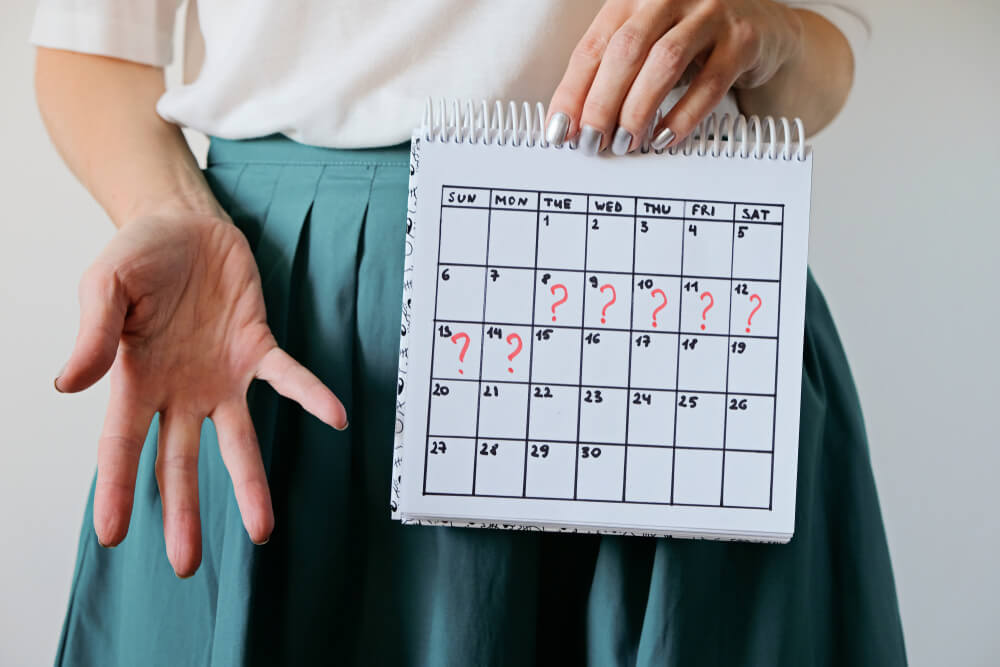From the beginnings of adolescence up until their 50s, on average, women have their monthly cycles and get periods on a relatively regular basis. Obviously, things change during pregnancy, but if you’re still in your 30s, be prepared for some changes in your menstrual cycle after 40 as well. After all, the female cycle is closely linked to hormones, and when women turn 40, things start to change a bit in that aspect. That said, let’s go over the most common period changes at 40 that you could expect.
1. Less Frequent Periods
For a woman, official menopause means not getting her period for an entirety of 12 months. However, things are not as straightforward when hormonal and period changes at 40 are concerned. Of course, it’s not set in stone that women will go through menopause in their 40s, but what is very likely to happen is going through perimenopause, which is the transitional period before menopause that could last up to five years. And during perimenopause, the period is likely to get sparser and less regular. What’s more, the flow itself could become gradually lighter.
2. Period Could Skip a Whole Month

As mentioned, unless your period skips 12 months in a row, you’re still not ready to forever bid farewell to your pads and tampons. Changes in the menstrual cycle after 40 also involve having a period skip a whole month on occasion. This is due to the fact that the production of estrogen at that point in time starts to slow down. This could lead to your body not being able to release an egg, which in turn means no period.
3. Periods Getting Closer Together
On the complete opposite end of the spectrum, some women could also notice their periods getting closer together in their 40s. There’s no rule when it comes to menstrual cycles and how each woman’s body will react. Just like some women will have the production of progesterone and estrogen slow down, some will experience a higher yet shorter surge of these two hormones. The latter is the main reason behind periods getting closer together, as well as random bleeding and spotting.
4. Heavier Flow Is Also Possible
We already established this, but changes in the menstrual cycle after 40 can be really unpredictable. Some months, your period could be late. Sometimes, it will be regular, but the flow will get lighter. And sometimes, you’ll skip a period for a month or even two. And during those times when you skip your period, and the egg doesn’t get released, the uterus lining will grow more, which could make the next period you get a lot heavier since your body needs to discard all that lining.
5. Your PMS Could Get Moodier
Period changes at 40 are caused by fluctuating hormones, and all those twists and turns could also affect your mood. So, if you tend to get mood swings during your PMS, it’s quite possible that those emotional ups and downs will get even more prominent in your 40s. Some women even experience depression during this period, and if that happens to you, don’t hesitate to get in touch with your doctor and explain the situation. You wouldn’t be alone in this case since many women get treated for depression as a result of their perimenopause.
6. Painful Periods in Your 40s
Even though your menstrual cycle could become irregular and the flow lighter, you’ll still have to deal with the accompanying cramps. And the unfortunate thing is that you might experience even more painful periods in your 40s. Since the production of progesterone and estrogen could occur in shorter intervals and higher surges, really painful periods in your 40s may mark the beginning of perimenopause. However, there’s no reason to be too desperate as the cramping will get less severe as you’re nearing menopause.
7. Pre-Period Breakouts
When hormones start working like crazy in adolescence, a lot of teenage girls have to deal with breakouts. Those girls might also have to go through this again in their 40s. In the latter case, hormones are slowly shutting down, but that still causes similar fluctuations and disbalance in the body to the one we typically experience in high school. Therefore, getting acne and breakouts in your 40s is not completely off the table. But this too will pass, much like the night sweats and hot flashes that are typical for the perimenopausal time.
8. Pregnancy Is Still Possible

It’s only natural that your fertility will drop as you go through your 40s. However, as long as your eggs get released, no matter how irregularly, you can still get pregnant. Essentially, your chances of getting pregnant are only 0 once you are officially menopausal. It is very important to mention, though, that pregnancies in this decade of a woman’s life carry some serious risks. Sadly, the probability of a miscarriage and genetic ‘errors’ is rather high. To prevent unwanted pregnancies in your 40s, using some kind of birth control is a good idea.
Treating the Symptoms of Perimenopause
Perimenopause is not an illness but a normal part of every woman’s life. In that sense, it doesn’t require treatment per se. However, perimenopausal symptoms can be rather annoying and challenging, and you can definitely treat those. Of course, make sure to discuss your issues and treatment options with your OBGYN first.
- To manage the fluctuation of hormones, you could take birth control pills that contain a smaller estrogen dose.
- If you experience emotional and mental issues such as depression, taking antidepressants could help. What’s more, they could also be very useful to manage hot flashes.
- There are different supplements and vitamins that can improve your overall health, especially after you hit 40 years of age.
- If you deal with a lot of anxiety and mood swings, it’s more than recommended to try some interesting practices such as meditation and mindfulness.
- The changes you’re experiencing are huge. After decades of knowing your cycle and body, you’d have to get used to a whole new “normal,” and counseling is an effective way to learn how to manage this shift.
- You could discuss a change in your diet with your doctor as well to maintain a healthy gut and weight during this transition period as well as minimize the risk of menopause and constipation combo that many women tend to experience.
- All kinds of physical activity such as yoga, cardio, and strength training can make a huge difference during perimenopause and help with mood betterment, bone strengthening, weight management, as well as decreasing the risk of heart-related illnesses.
Once you turn 40, experiencing bodily and menstrual cycle changes is perfectly normal. Don’t stress yourself over these changes thinking they could be something worse. Of course, if you feel unsure about anything, don’t hesitate to reach out to your doctor. This a strong suggestion as your doctor will be able to walk you through the process that occurs during this transitional period as well as help you keep track of everything that’s happening. For all your questions and concerns, you’re always welcome to contact us at University Park OBGYN and schedule an appointment with the best gynecologist in Florida who meets your criteria and makes you feel comfortable. We have already helped thousands of women with their GYN health, pre-, post-, and during menopausal changes, and we can help you lead a happier life, too.


